WRI India COP28 Digest

WRI India Leadership at COP28
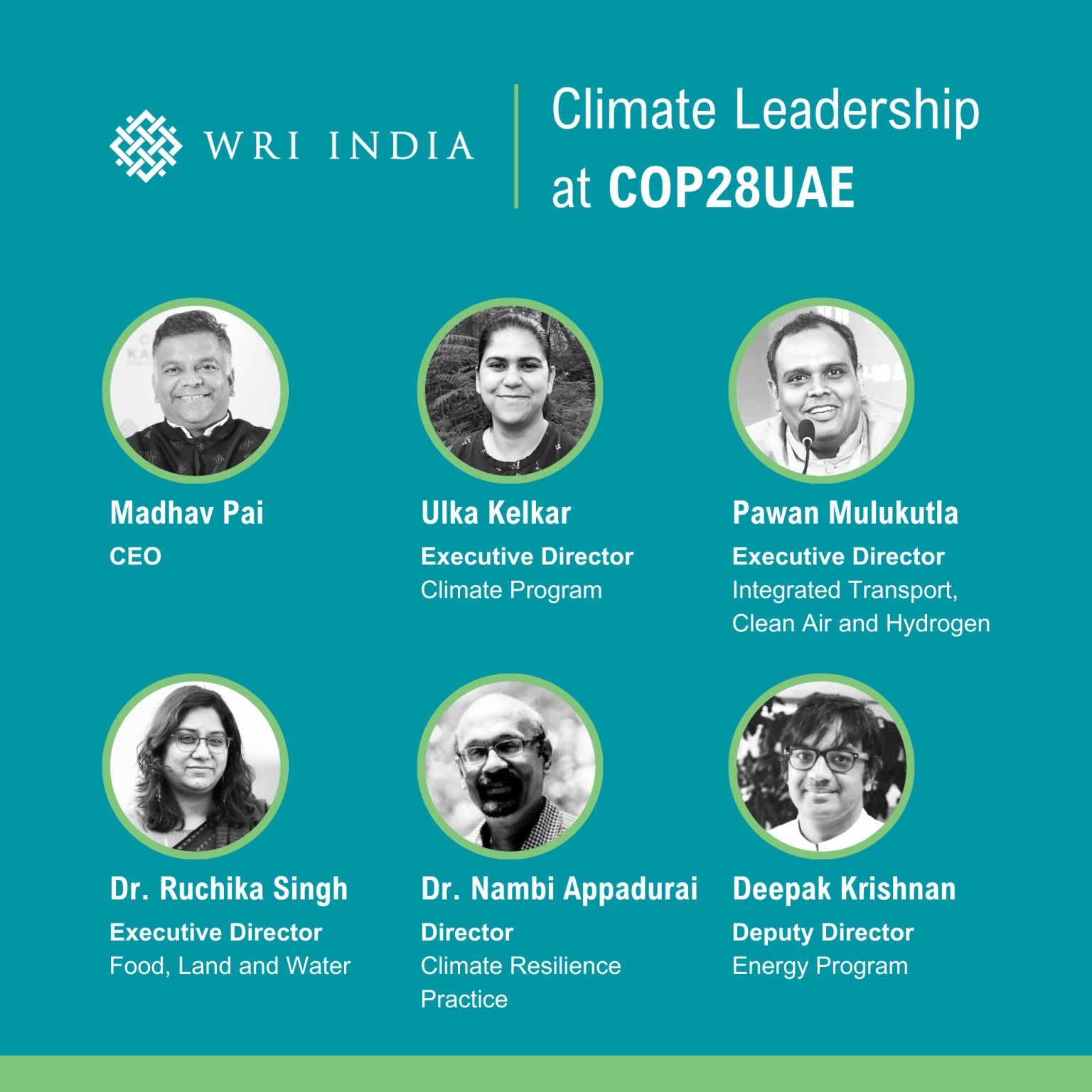
Experts and climate leaders from WRI India attended COP28 in UAE to deliberate on key issues, including a just transition to clean energy, climate finance, locally led adaptation, decarbonization of public transport with a focus on e-buses, green Hydrogen, and food loss and waste.
Madhav Pai, CEO, WRI India participated in high-level discussions on the global, national and sub-national agenda and action plans related to Just Transitions, Renewable Energy, Climate Action and catalyzing Green Finance. He spoke at sessions on sub-national actions on climate change, resilient renewable energy supply chains and unleashing the potential of public-private-philanthropic partnerships for agriculture, among others.
Ulka Kelkar, Executive Director, Climate, tracked discussions on Climate Finance, Just Transition, and Global Stocktake. She also spoke at Climate Strategies' side event on ‘Connecting International Cooperation to Local Realities of the Just Transition’.
Dr. Ruchika Singh, Executive Program Director - Food, Land and Water, followed conversations around transforming our food systems and agriculture. Minimizing food wastage and loss is a win-win solution for people as well as the climate. By helping us build a sustainable food system, it offers multiple opportunities - better food and nutrition security for people, less economic losses and healthier food and land systems.
Pawan Mulukutla, Executive Program Director – Integrated Transport, Clean Air, & Hydrogen, played a proactive role in crucial deliberations on subjects related to electric mobility, sustainable transition of the automotive sector, decarbonization of the transport sector, the successful electrification journey of e-buses in India and the potential of green hydrogen as an alternate fuel for transportation.
Deepak Krishnan, Deputy Director, Energy Program, followed discussions and developments related to multiple aspects of the clean energy transition. He also spoke at Shakti Foundation's event Powering the Future: Offshore Wind Energy for India on 4 Dec.
A. Nambi Appadurai, Director, Climate Resilience Practice, tracked discussions on locally led adaptation, climate finance, sub-national actions, transformative adaptation and just transition. He contributed to the discussions around these issues through various engagements as a speaker and participant.
WRI India @ COP28
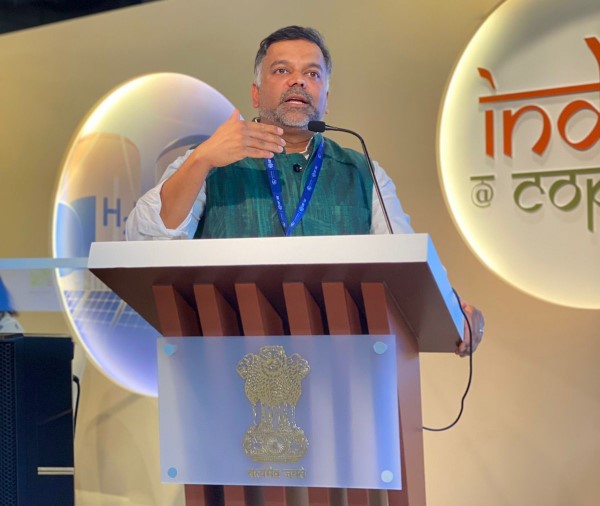
Side-Events
‘Cross-Country Just Transition Dialogue: Exploring Vulnerabilities and Financing Needs for an Equitable Low Carbon Transition’
Highlights
WRI India organized a “Cross-Country Just Transition Dialogue: Exploring vulnerabilities and financing needs for an equitable low carbon transition” at the sidelines of COP28 in Dubai on December 8, 2023.
By bringing together over 20 representatives from different countries, the event facilitated insightful discussions and enabled the sharing of experiences and examples from the countries. It also brought to fore how different countries are in varying stages of understanding and addressing low-carbon transition impacts and challenges faced in engaging with diverse stakeholders, including policymakers.
Highlights from the session included the need:
- For research and evidence to inform the Just Transition discourse
- For bridging the research-policy gap
- For institutional preparedness to engage with questions of Just Transition
- For private and public sectors to finance the transitions

‘‘Advancing Gender Equality in Transport Climate Action’’
Highlights
Ulka Kelkar, Executive Director, Climate, WRI India, recently spoke at a COP28 side event on ‘Advancing Gender Equality in Transport Climate Action’, organized by the United Nations ESCAP, International Labour Organization, FIA Foundation and ITF - International Transport Forum (ITF).
She highlighted several policy frameworks that can accelerate gender equality in climate change policies, including the transport sector:
- Subsidized Public Transport: In Karnataka, the government offered free bus rides to all women, regardless of their economic status. Within five months, there were over one billion free rides availed by them. This policy has aimed to make public transport more accessible to women and empower them to utilize these services.
- Inclusive Targets: Delhi introduced a policy to introduce more electric buses into the city's transport system. A noteworthy condition in the tender process was to have a certain number of women trained as drivers. This approach hopes to promote gender equality, cleaner transportation and skill development for women.
- Concessional Loans for Women: In Uttar Pradesh, concessional loans with lower interest rates were made available to women's self-help groups interested in operating electric three-wheelers for transportation. This policy has encouraged women to enter the transportation sector and has also created job opportunities for them.
Ulka emphasized that these policy frameworks demonstrate the potential for gender-responsive actions in the transport sector. They can enhance women's access to transportation, provide employment opportunities and contribute to cleaner and more sustainable mobility options. She also added that mainstreaming gender equality in the transport sector involves recognizing and addressing the unique needs and challenges faced by women. This requires data, collaboration, training, representation and financial resources.
Catch the complete discussion here.
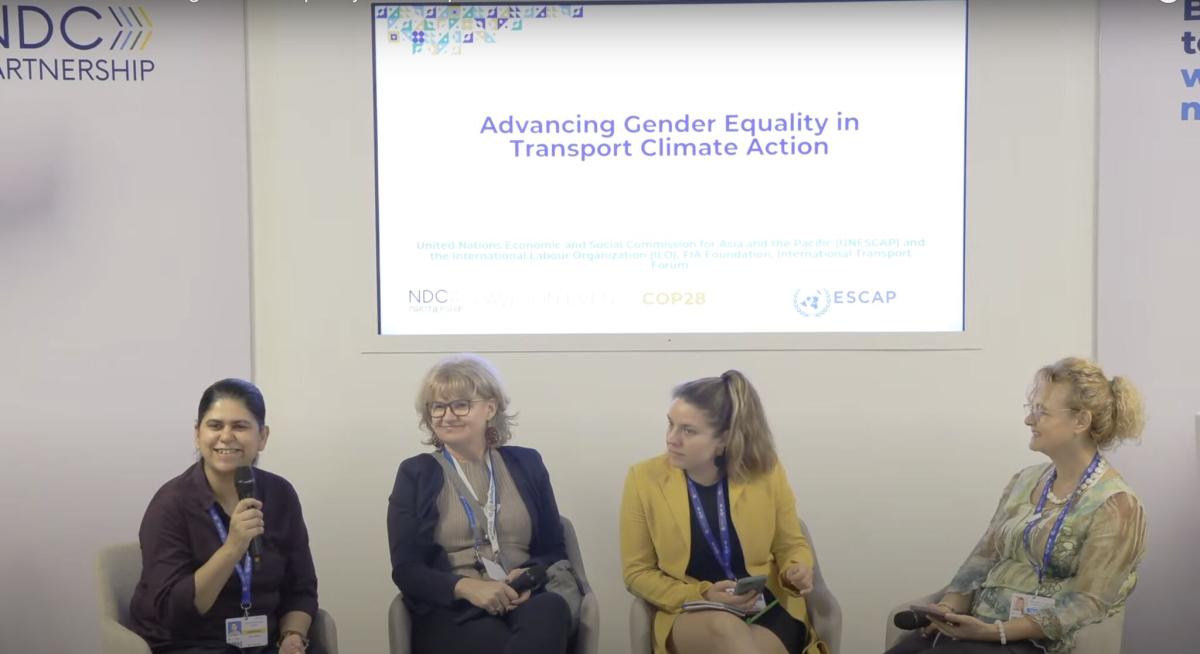
‘Accelerating Global Climate Actions via Subnational Leadership’
Highlights
WRI India, jointly with The Climate Group and #RaceToZero - The UN Climate Change High-Level Champions, organized a COP28 side event on ‘Accelerating Global Climate Actions via Subnational Leadership’ during the South-South Capacities Day under the aegis of 5th Capacity Building Hub.
The session included an esteemed panel that highlighted the importance of subnational and local climate actions from the Global South and how these are driving regional and global climate action. It also put a spotlight on select climate champions, showcased peer-to-peer learning best practices, and brought out leadership voices from the Global South. Speakers included:
- Aaditya Thackeray, Former Environment Minister, Government of Maharashtra (GoM), India
- Jane Lumumba, Africa Delivery Lead, High-Level Climate Champions
- Punit Gandhi, Lead (Projects), Climate Centre for Cities (C-CUBE), National Institute of Urban Affairs (NIUA)
- Braulina Baniwa ( Ela/Dela), Director, ANMIGA
- Sonia Cooper, Special Cultural Rapporteur for Martuwarra Fitzroy River Council (MFRC)
- Starlene Sharma, Founding Partner, Green Artha
- Saransh Bajpai, Associate Director, Climate, WRI India
- Rana Pujari, Senior Manager - South Asia Government Relations, Climate Group
- Saurabh Jain-Punamiya, High-Level Climate Champions
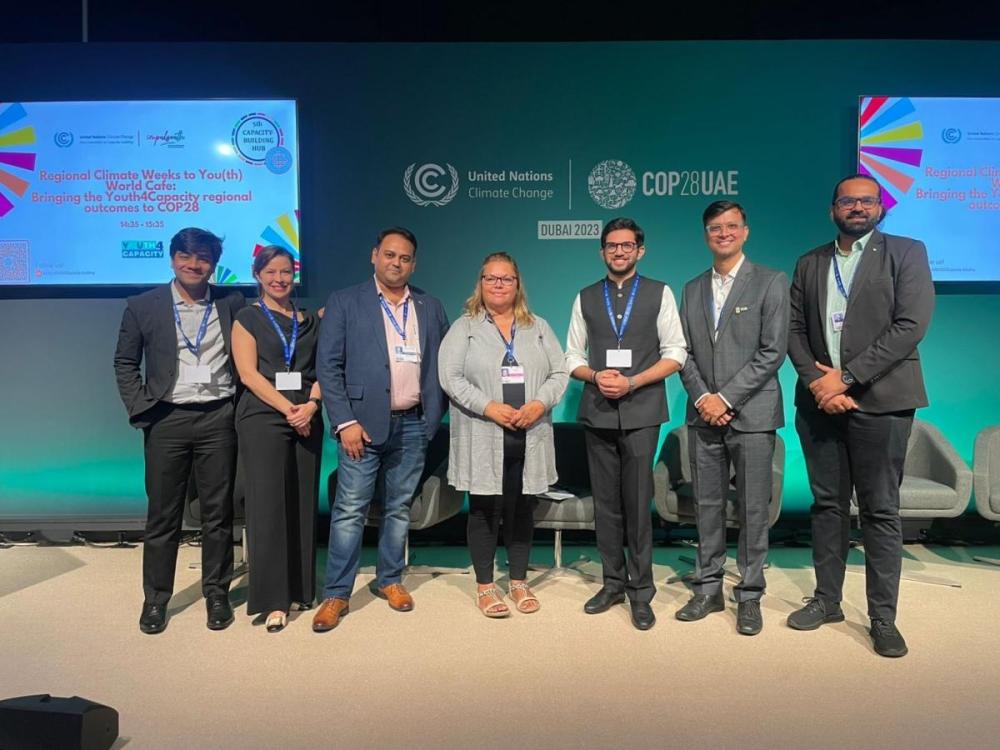
Here are the key takeaways from the session:
- Subnational entities play a crucial role in addressing climate change, as they are often closer to communities and better understand local vulnerabilities and needs.
- Collaborative efforts, capacity building, and financial support are essential for effective subnational climate action.
- Indigenous communities and their knowledge are integral to the climate justice movement and should be actively involved in climate solutions.
- Platforms and campaigns like Race to Zero can help cities and regions report climate-resilient benchmarks and collaborate on climate action.
- Decentralization of funds to strengthen the capacity of local governments is a viable approach to support climate initiatives at the subnational level.
Watch the complete discussion here.
See post on Linkedin.
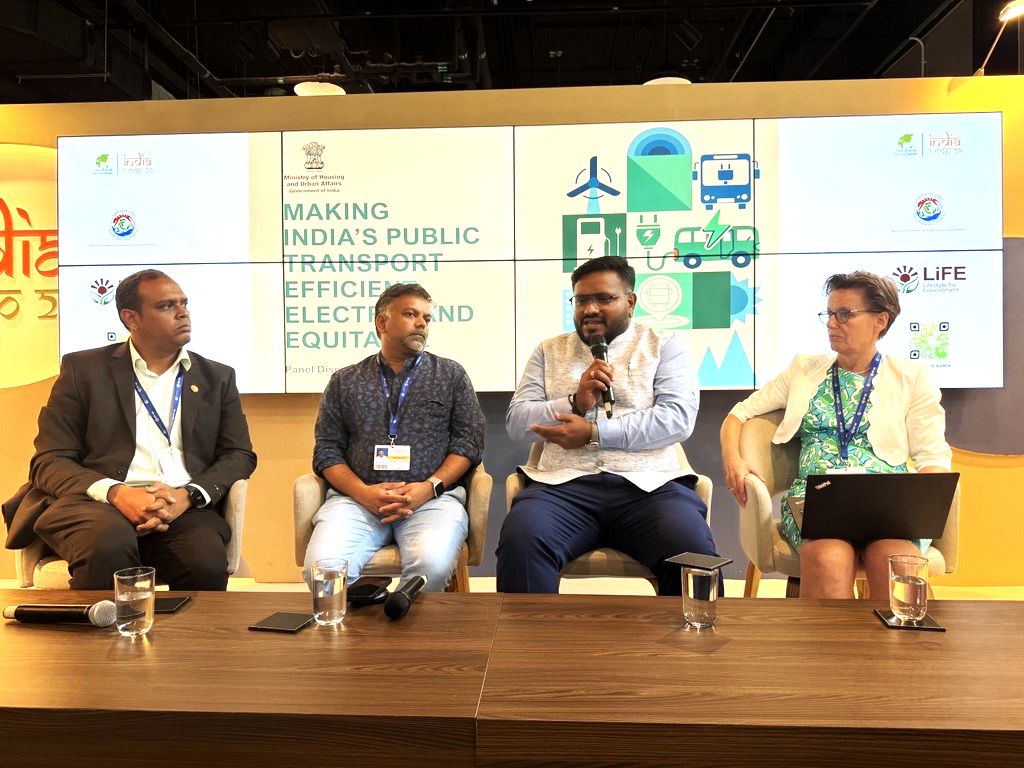
‘Making India’s Public Transport Efficient, Electric and Equitable’
Highlights
At COP28 UAE, the Ministry of Housing and Urban Affairs (MoHUA) hosted a panel discussion on ‘Making India’s Public Transport Efficient, Electric and Equitable’, which brought together global experts to discuss the creation of accessible, inclusive and resilient public transport infrastructure.
Moderated by Pawan Mulukutla, Executive Director- Integrated Transport, Clean Air and Hydrogen at #WRIIndia, the session highlighted India’s successful journey towards public transport transformation with the adoption of electric buses at scale. Panelists included Madhav Pai, CEO, WRI India, Barbara Schnell, Director-Sector Policy, KfW and Narayankumar Sreekumar, Associate Director-Electric Mobility Program, Shakti Sustainable Energy Foundation.
Key insights from the event included:
- There has been a paradigm shift in Indian bus operations from capital expenditure-based (CAPEX) incentive model to operational expenditure-based (OPEX) incentive model.
- Demand aggregation has significantly reduced the cost of procuring e-bus services through economies of scale. Streamlining contracts across geographies with risk mitigation measures has boosted the confidence of bidders.
- Implementing payment security measures can boost the bus sector's creditworthiness. The ambitious objective is to extend bus loan durations to 10 years at an 8% interest rate, aiming for an extra 30% reduction in costs.
- Creation of a robust digital public infrastructure can help in creating a more convenient, transparent, and accessible public transport system. Utilizing DPI will make data repositories interoperable across various segments of transit operations, making the entire experience more efficient for both operators and commuters.
- An opportunity lies in the nurturing private operators to run buses, as OEMs typically focus on contracts and lack operational expertise. By fostering approximately 100 private operators in India, each managing a manageable fleet, operational efficiency and potential savings can be tapped into.
- As we scale e-buses across cities, a parallel pursuit to integrate renewable energy for addressing the growing power demand for vehicle charging should be prioritized. As an increasing number of electric vehicles are powered by clean energy, the transition will become more sustainable.
‘Land Use in the Era of Climate Mobility’
Experts Speak
“While we are doing and using all this machine learning, the important part is, the most vulnerable people are the ones about whom we don't have any data, because it is all informal settlements, it is related to informal sector, informal jobs. They are the ones who are getting more impacted. When we are developing these models, one interesting part is also how do you overcome this bias because the models will talk about the impact of the formal sector, but the informal sector job loss, informal sector climate impact would be very difficult to quantify. So, I think that is both a challenge and an opportunity.”
- Pawan Mulukutla, Executive Program Director - Integrated Transport, Clean Air and Hydrogen, WRI India
AI can transform climate action! In land use monitoring, AI can analyze photos, satellites & drones for insights. Yet, a challenge in funding persists, especially in the developing world. @WRIIndia's @PawanMulukutla speaks at #COP28UAE on 'Land Use in the era of Climate Mobility' pic.twitter.com/qt9RdKeyzt
— WRI Cities India (@WRICitiesIndia) December 6, 2023
See the full post on Linkedin.
‘Leading E-Bus Transition: Global Experiences and Learnings’
Highlights
As critical conversations around e-mobility gain momentum at #COP28, experts from around the world convened in Dubai on December 5 to deliberate best practices and strategies to advance a decarbonized and digital future for public transport, at WRI India’s roundtable session ‘Leading E-Bus Transition: Global Experiences and Learnings’. Key insights from the event included:
- Local manufacturing and at-scale production of e-buses is the need of the hour, with a special emphasis on modern and affordable product design. This will increase parity and encourage local skill development.
- Entry points for employment in the bus sector must be reformed for an inclusive recruitment process and gender parity. For example, changing driving license requirements for heavy driving can encourage more women to join the workforce as drivers
- Digital Public Infrastructure can be leveraged to embed inclusivity and accessibility in public bus services. Digital integration with charging, fleet, power and optimization solutions can enhance convenience for riders and operators, as well as improve transparency in operations
- Ensuring the availability of scaled green funding will give a significant boost to e-bus adoption across the Global South. The availability of support for pilot programs and technical assistance will help scale-up e-bus adoption.
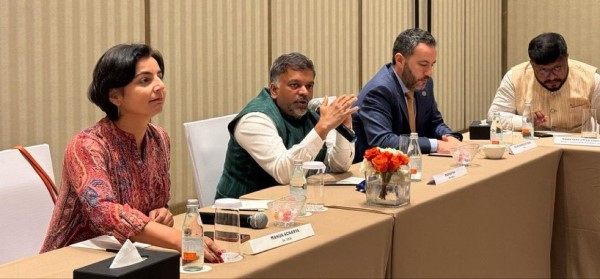
'Equitable Workforce Transition in the Auto Industry: Perspectives from India and the US’
Highlights
WRI India, along with Ares Charitable Foundation and the MacArthur Foundation, hosted a COP28 side event on “Equitable Workforce Transition in the Auto Industry: Perspectives from India and the US" hosted on December 3. Key insights from the session include:
- Ashwini Hingne, Associate Program Director, Climate, WRI India, set the context for the session and shared insightful findings from WRI India’s research on automotive MSMEs:
- Regional hubs must proactively plan for the transition, understanding associated risks and necessary interventions for attracting EV manufacturing.
- Advocated for designing accessible and tailored skilling programs.
- Highlighted the pivotal role of larger corporations in supporting these enterprises.
- Allen Blue, VP-Product Development & Co-founder at LinkedIn, addressed the growing demand for green skills in the job market, emphasizing the substantial gap between job availability and the growth rate of green skills, urging a concerted effort to bridge this disparity. Allen also highlighted the risk of project failure due to a lack of skilled workforce and suggested financiers play a pivotal role in driving skill development alongside project financing.
- Bandana Preyashi, Secretary, DoEFCC, Govt. Of Bihar, emphasized on making transition opportunities accessible to women, focusing not only on skilling but also on creating a safe ecosystem with flexible work hours and day-care facilities.
- Diana Junquera Curiel, Director at IndustriALL Global Union, stressed the importance of including workers in just transition dialogues, particularly in improving working conditions within the unorganized sector.
- Michelle Armstrong, Managing Director, Head of Philanthropy at Ares Management Corporation and Executive Director of the Ares Charitable Foundation, underscored philanthropy's role in ensuring a fair transition, urging support for individuals entering the green workforce. She also spoke about the importance of funding in supply chain equity to address the larger issue related to the low carbon transition, which will require promotion of collaborative dialogues between MSMEs and larger corporations.
- Seema Arora, Deputy Director General at Confederation of Indian Industry, called for an ecosystem approach, highlighting the critical gaps in finance and skilling, emphasizing the need for policies that inclusively integrate marginalized communities into the workforce.
To catch the entire session, watch ️from 2:01:40: https://lnkd.in/gMXGCFSG
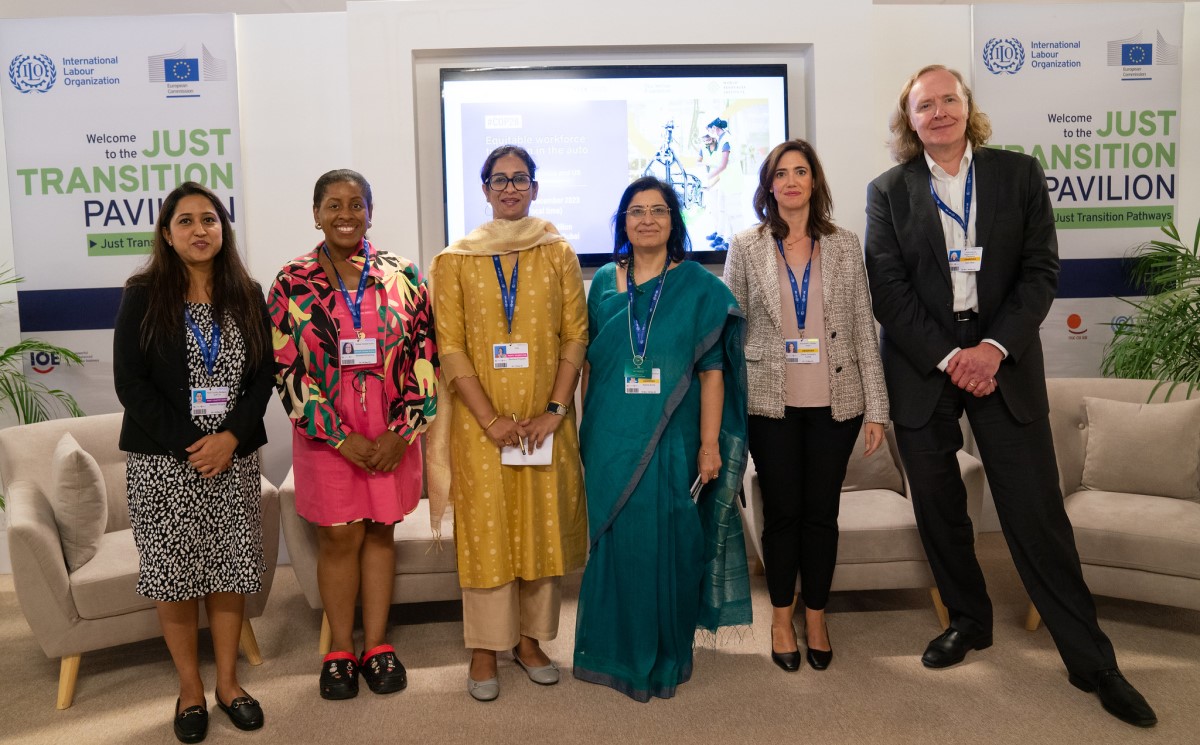
India pavilion event on Resilient RE Supply Chains
Experts Speak
“It was a good discussion on trying to diversify the supply chains for renewable energy equipment, technology, materials and finance flows. With colleagues from USA and Japan we discussed opportunities to leverage existing bilateral, multilateral and plurilateral partnerships.”
- Madhav Pai, CEO, WRI India
Shakti Sustainable Energy Foundation's side event titled 'Operationalizing Carbon Markets to Achieve Energy Transition Goals.'
Experts Speak
“A well-designed carbon market has the ability to lower the cost of achieving the NDC targets. Besides, it opens opportunities for attracting finance through international market-based mechanism.”
- Subrata Chakrabarty, Associate Program Director, Climate, WRI India
(Read our carbon markets report here.)
COP28 Outcomes
Experts Speak
"From an Indian perspective, this text displays greater parity between coal and other fossil fuels but it appears to absolve developed countries of the responsibility of phasing out their fossil fuel use 'in this critical decade'. In fact, the reference to 'transitional fuels' explicitly gives gas producing countries the license to sell more gas rather than invest in renewable energy. It also exonerates the developed countries from making up the finance gap so far, though it recognizes that the gap in adaptation finance is 'widening' and that doubling the current low levels of adaptation finance will be insufficient."
- Ulka Kelkar, Executive Director, Climate, WRI India

